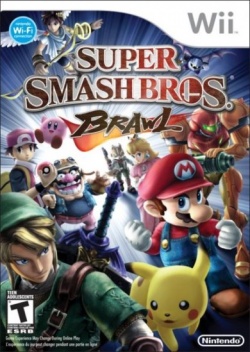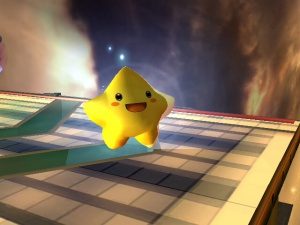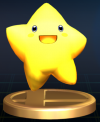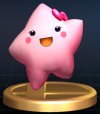Super Smash Bros. Brawl
| Super Smash Bros. Brawl | |

| |
| Developer(s) | Nintendo/Sora and various others, notably Game Arts |
| Publisher(s) | Nintendo |
| Director(s) | Masahiro Sakurai |
| Producer(s) | Kensuke Tanabe, Keisuke Terasaki, Akiya Sakamoto |
| Character Design | {{{characters}}} |
| Composer(s) | Many, Takahiro Nishi, Shogo Sakai, Masaaki Iwasaki, Yutaka Iraha, Keigo Ozaki, Kentaro Ishizaka |
| Release date(s) | |
| Genre | Fighting |
| Rating(s) | CERO: ESRB: PEGI: USK: OFLC: GRB: |
| Platform(s) | Wii |
| Mode(s) | Single Player, Multiplayer, Multiplayer online |
| Serial code(s) | {{{serialcode}}} |
Super Smash Bros. Brawl (known as Grand Melee Smash Brothers X[1], 大乱闘スマッシュブラザーズX in Japan) is the third game in the Super Smash Bros. series of games and the sequel to Super Smash Bros. Melee. It was released for the Wii. The game features many characters from the Nintendo world fighting each other and introduces third-party characters Sonic the Hedgehog and Solid Snake.
Super Smash Bros. Brawl is the predecessor to Super Smash Bros. for Nintendo 3DS and Wii U.
Appearance of The Legendary Starfy series characters
Starfy has a small role in Brawl as an Assist Trophy. An Assist Trophy is an item that allows players to have another character help them in battle.
Starfy is known as one of the weakest Assist Trophies, mainly due to the fighters ability to attack and push him off the stage, unlike other Assist Trophies. Starfy's only method of attacking in Brawl is using Star Spins. When Starfy appears, the sound effect heard at the beginning of the tune Confrontation with the Boss in the first four The Legendary Starfy series games plays.
In addition, both Starfy and Starly (called Stafy and Stapy respectively) appear as regular trophies, and Starfy, Starly, Moe (Kyorosuke), Chonmagyo, Mattel (Materu), Seiuchi-kun and Herman (Yadokarita) appear as stickers. There are two Starfy stickers: one of which depicts the official artwork of Starfy swimming from Densetsu no Starfy, and the other of which depicts the official artwork of Starfy wearing one of the Stuff (possibly the Aloha Shirt) from Densetsu no Starfy 2.
The Starfy trophy is obtainable by clearing Target Smash!! Level 1 with at least 10 different characters. The Starly trophy can be obtained randomly.

Trophy descriptions
| Name | Image | Game | Description |
|---|---|---|---|
| Stafy | 
|
GBA | The prince of the kingdom of Tenkai. He's a bit spacey and clumsy, but when he sets his mind to something, he gives it his all. Stafy gets help from his friends Kyorosuke the clam and the wizened Lobjii-san. Stafy sometimes dons a pig suit and throws pork cutlets. In Densetsu no Stafy 3, Stafy meets Wario and goes with him to steal the treasures of the deep. |
| DS |
| Name | Image | Game | Description |
|---|---|---|---|
| Stapy | 
|
GBA
|
Stafy's younger sister, known for her jumbo pink ribbon, and princess of a floating kingdom. Stapy has a bold nature that contrasts her reserved brother. Though she is younger, Stapy is often the spark that motivates the sometimes spineless Stafy. Only Stapy can perform Wall Jumps, High Hats, and High Hat Spin Jumps. For an unknown reason, Stapy has a Kansai accent. |
|
DS
|
Playable characters
- Mario
- Luigi
- Peach
- Bowser
- Donkey Kong
- Yoshi
- Link
- Zelda/Sheik
- Ganondorf
- Samus
- Ice Climbers
- Kirby
- Fox
- Falco
- Captain Falcon
- Pikachu
- Jigglypuff
- Marth
- Ness
- Mr. Game & Watch
Newcomers
- Diddy Kong
- Wario
- Toon Link
- Zero Suit Samus
- Pit
- R.O.B.
- Meta Knight
- King Dedede
- Olimar
- Wolf
- Pokémon Trainer
- Lucario
- Ike
- Lucas
- Snake
- Sonic
Trivia
- Although Starfy ("Stafy") is not a playable character in Super Smash Bros. Brawl, the trophy of Starfy ("Stafy")'s sister Starly ("Stapy") is indexed under the "Fighter Related" category. Furthermore, no Custom Robo or Animal Crossing trophies appear in the "Fighter Related" category even though Stafy, Ray MK III and Mr. Resetti all appear as Assist Trophies.
- This has lead to speculation that Starfy may have once been planned as a playable character in the development of Super Smash Bros. Brawl.
External Links
- Starfy at SmashWiki
- Super Smash Bros. Brawl at SmashWiki